- Home
- Michael Byrnes
The Sacred Bones Page 31
The Sacred Bones Read online
Page 31
In their suite at the Fiumicino Hilton, Evan and Charlotte sipped coffee as they relaxed in armchairs facing the sun-filled window, overlooking the airport's busy runways. Not exactly classical Italian romance for a surprise rendevous, but Charlotte had insisted that she wouldn't feel safe going back into Rome.
She pulled her bathrobe snug and eyed Evan affectionately, a light breeze ruffling her hair. Finally, she had achieved a good night's sleep. All it had taken were a couple of glasses of wine and a sleeping pill. The unexpected and utterly gratifying bout of lovemaking hadn't hurt, either. Having told Evan all about the incredible events that had taken place over the past few days, she'd shown him the astounding presentation stored on her laptop. He convinced her that everything would be okay-- regardless of any confidentiality agreement she'd signed. Nonetheless, he had booked the room under his own name, just to be safe.
Given BMS's involvement in the analysis, they'd have to be very careful, Evan reminded her. He suggested waiting to see what would come of Dr. Bersei's claims against the Vatican, feeling that it was much too early to assume anything fatal had happened to him.
Adoringly, she gazed over at him. "I really missed you, Evan. And I'm sorry about how I've been acting lately."
"It's not exactly like I've been on my best behavior either." He smiled. "Hey, I know yesterday wasn't the best time for this, but I've been dying to show you something, Charlie. You have no idea."
He looked awfully excited, she thought.
Getting up, he slalomed around the room service cart and went directly to his bag. Unzipping its side pouch, she watched him take out a small box, a key ring, and what looked like a vial. He retrieved her laptop from the nightstand and sat back beside her, placing the items on the round table that sat in front of the window.
She shot him a look. "What's going on?"
"I was going to call you," he said. "But I knew that we'd need to talk about this face to face. First off, this is for you. Honestly, it's the real reason I came here." Smiling, he held out the small box in the palm of his hand.
Seeing it, her heart skipped a beat. It looked like a jewelry box-- the perfect size for...Had he come here to propose? She took it from him and straightened in her chair.
"Go ahead. Open it."
She glanced at him. Not exactly the most romantic approach.
"It's that bone sample you sent me."
"Oh," she said, feeling simultaneously relieved and disappointed. Pulling the lid away, she stared down the aged metatarsal that could've easily been confused with a fossil. Sitting on a piece of white gauze, there was a perfect hole drilled into its center where Evan had extracted its DNA. She gently touched it with her index finger.
"You remember that anomaly we discussed?"
"Of course." She wondered what he could have found that would bring him halfway around the world. "What about it?"
"First off, did anyone else perform an analysis on these bones?"
She shook her head. "Just carbon dating at the AMS outfit in Rome, and that sample's been incinerated."
"How about the rest of the skeleton?"
She pictured the ancient bones reassembled on top of the black rubber matting. Yesterday morning they had disappeared, along with the ossuary and its relics. "The Vatican still has it." Or did they?
"Good." He was clearly relieved. "Cause when you see what I have to show you..." Aldrich uncapped the tiny flash drive that dangled off his key ring and inserted it into the laptop's data port. Flipping up the screen, he brought up a media player window and activated a file. A video clip began loading for playback. "I thought the scanner was malfunctioning when I saw this," he explained. "Almost gave me a heart attack. Turns out the scanner's working just fine. It's the sample that can't be right." The clip finished loading.
She leaned closer.
"Here we go. The first thing you'll see is the karyotype. I'll pause it when it comes up." As playback began Aldrich froze the image.
Charlotte's eyes trained on the wormlike chromosomes, arranged side by side in order of length. Fluorescent dyes assigned different colors to each pairing, labeled 1 to 23, X and Y.
"Even here the mutation is evident."
"Which pair is the anomaly?"
"Look closer," Aldrich instructed. "You tell me."
She scrutinized the image. As soon as her eyes alighted on the twenty-third chromosome set, she spotted something odd. Under a microscope one expected each chromosome to exhibit visible bands along its length. Pair twenty-three didn't have any banding. "What's with twenty-three?"
"Exactly. Let's keep moving and hopefully it'll start to make some sense."
Aldrich brought up another screen showing a super-magnified cell nucleus, as it would appear in microscopic view. The chromosomes and nucleotide material were present in their natural, unordered state. The cell's nuclear wall was barely visible along the screen's periphery.
"I marked the twenty-third chromosome pair." Aldrich pointed it out. "See?"
Bright yellow circles were drawn around the two anomalous chromosomes.
"Got it."
"Watch closely, Charlie. Here comes the extraction."
"What?"
"I'll explain in a sec." She noticed that Aldrich's left leg was bouncing up and down.
On the screen a hollow glass needle penetrated the nuclear membrane, its sharp angles in stark contrast to the natural cellular construct. Next some chromosome pairs-- though not the twenty-third pair-- were extracted.
"I was removing the chromosomes for the karyotype." On top of the media window, the extracted chromosomes appeared along a black bar, in size order and he pointed to them. "Here are the extracted pairs. So far, so good?"
"Yeah."
On the screen, the needle retracted from the nucleus and the membrane shrank back over the puncture.
"Now watch this."
That's when she saw something remarkable unfold. The unbanded twin chromosomes-- still inside the cell's nucleus-- instantly began to divide, churning out new chromosome pairs to replace the extracted material. The spontaneous regeneration stopped once the nucleus had reached its odd equilibrium-- forty-eight chromosomes.
"What did I just see?" She tore her eyes from the screen. "Evan?"
He looked up at her intently. "A huge biological discovery. That's what you just saw. I'll play it again."
Playback was reset to the point where the needle was extracted. The black bar with the missing chromosomes was on top of the screen again. And then there it was, just as Evan had said-- the most remarkable biological process she had ever witnessed-- spontaneous genetic regeneration.
Charlotte covered her mouth. "But that's completely impossible."
"I know."
Nothing on earth could explain what she'd just witnessed. "It's absolutely scientifically impossible for any human chromosome to replicate exact copies of other sets. There's DNA from the mother, the father...a complex genetic code."
"Violates everything we know as scientists," he stated flatly. "I had a very difficult time coming to terms with this myself."
Silence.
"Want to hear more?" He flitted his eyebrows and was beaming again.
"You mean this gets better?"
"Much." Aldrich collected himself. "I performed a thorough analysis using the new gene scanner and mapped out the DNA's coding, comparing it with published genome maps. You know what I'd be looking for?"
"Anomalies in the three billion base pairs," she replied.
The typical genome molecular diagram resembled a spiral ladder or double helix with horizontal "rungs" formed from pairs of adenine and thymine or guanine and cytosine-- otherwise known as the building blocks of life. Three billion of these rungs were spread out over the tightly wound chromosome strands, forming "genes"-- unique DNA segments specific to bodily organs and functions. With the laser scanner, gene sequences could be analyzed to detect corrupted coding resulting in mutation.
Aldrich leaped up and paced aroun
d. "Well, I found that the sample you'd sent me registered less than ten percent of the total expected genetic material found in the standard human genome."
Charlotte eased back into her armchair, shaking her head in disbelief. "I don't understand."
"Me either," Aldrich replied. "So I did a lot more testing. Using our new system to compare the genome to all known anomalies, I came up with...ready for this? No matches. Nothing! Not a single one!"
For a moment her rational mind shut down. No explanation came. "What does that mean?"
"This sample has no junk DNA!" Aldrich was shouting.
Before the Human Genome Project's completion in 2003, scientists believed human superiority over other organisms-- especially in intelligence-- would translate to a substantially larger, more complex genetic code. But the human genome had fallen far short of expectation, having only one-twelfth of the genetic content of an ordinary onion. Geneticists attributed the differential to junk DNA-- garbage heaps of defunct genes along the DNA strands rendered obsolete by evolution.
It sounded like a scientific fairy tale. But recalling the flawless 3-D physical profile the DNA sample suggested-- the absence of a known ethnicity, the androgyny, the unique coloring and features-- it made sense. "Evan, are you seriously telling me that this sample has DNA with a perfect genetic structure?"
He nodded. "I know it seems too good to be true."
A flawless genome implied the absence of an evolutionary process. An organism in its purest, most unadulterated form.
Perfection, she thought. But how could a human possibly exhibit that kind of profile? It certainly didn't jibe with what Darwin or modern science presented as the explanation for human development from primates.
Evan Aldrich waved a shaking hand at the screen. "This DNA could potentially be used as a template to spot anomalies in comparative samples. And it could be replicated using bacterial plasma."
Charlotte stared at him. "Aren't you getting a bit ahead of yourself?"
"It would take stem cell research to an entirely new level. I mean, this is perfect DNA in a viral form! Unimaginable." He spoke slowly. "A miracle, in fact. It got me thinking about the real consequences of making this public, how the world would respond. At first I thought how many lives could be saved, the effect on disease. Then I envisioned biotech companies scrambling to customize cures for the rich. And designer babies. And rationed healthcare. Biological elitism. It will only benefit the rich-- the poor won't get a piece of this. And even if they did-- using such a broad brush to wipe out disease would be devastating. Widespread longevity would lead to unprecedented population growth that would place enormous strain on all the world's resources."
She felt overwhelmed. "I see what you mean, but-- "
"Let me finish," he urged. "There's a point to all this." He reached over with his right hand and pinched the vial between his fingers, holding it up in front of her. "This."
66.
VATICAN CITY
Cardinal Antonio Carlo Santelli stared dejectedly out of his office window at the expanse of Piazza San Pietro and the giant obelisk at its center that glowed pure white in the morning sunlight. He panned over to the basilica and the statues of saints lining the rooftop. If Catholics knew his noble intentions-- to protect the faithful as a true servant of God-- would his image too be immortalized and adored there one day? Would he become a modern-day martyr? A saint?
It hadn't been just the high drama of the past few weeks. As far back as the Banco Ambrosiano scandal, the revelations he had witnessed during his tenure in the Vatican had gradually made him question his devotion to the Church. He wondered if his life had truly been in the service of a greater good, or whether he was fast becoming everything he'd once loathed as a young and idealistic priest.
Late yesterday morning, after personally seeing to Conte's release from the Swiss Guard detention cell, he'd given the reckless mercenary the go-ahead to eliminate the last potential complications that could implicate the Vatican in the Jerusalem debacle: the ossuary and its contents, of course; Father Patrick Donovan, next; then Dr. Charlotte Hennesey; and finally, her American lover, Evan Aldrich.
Yet more blood on his hands.
Last night, he had expected an update from Conte to confirm that both the relics had been eliminated. No call had come. Now he was starting to worry that the mercenary had double-crossed him, convinced that the next call from him would involve more money-- blackmail.
Worse, only minutes ago, he'd heard a news report concerning the death of a docent at the Torlonia catacombs-- not exactly the type of thing that made headlines. But the seemingly mundane incident had prompted a routine police inquiry from the only name listed on a visitors' sign-in sheet found in the docent's office. That had led investigators to the visitor's distraught wife who had just contacted the police to report that her husband hadn't come home last night. A search of the catacombs ensued. It hadn't taken the authorities long to find Giovanni Bersei's broken body at the base of a shaft.
Perhaps under better circumstances the incident could have been classified as an accident-- a strange intersection of misfortune for two men who happened to be in the same place. However, police had spoken to a witness-- a young woman jogger-- who had reported seeing a stranger exiting the site and loading the anthropologist's scooter onto a van. The photofit she had provided happened to bear an uncanny resemblance to another sketch coming out of Jerusalem.
The media was eating it up.
Any minute now, Santelli expected a call from the investigators.
Another scandal.
In each hand, Santelli held the two halves of the scroll the scientists had found in Christ's ossuary. In his left hand was the sketched ceiling fresco in Joseph's crypt deep within the Torlonia catacombs. In his right hand was the ancient Greek text that preceded the drawing, which he had asked Conte to separate from the picture, fearing the text might contain some overt message. Prior to sending Father Donovan to accompany Conte on his fatal journey, he had asked the priest to translate the Greek message-- the last remnant of Christianity's centuries-old threat.
The transcription was penned onto a crisp sheet of Vatican letterhead. Leaning over his desk, Santelli pieced together the scroll's halves beside it.
He had considered destroying the scroll, burning it. But now he prayed that something in it might settle him. Drawing a deep breath, he studied the original vellum one more time, then shifted his gaze over to read Father Donovan's transcription:
May faith guide us in our solemn vow to protect the sanctity of God. Here lay his son, awaiting his final resurrection so that God's testimony may be restored and the souls of all men may be judged. Let these bones not dissuade the faithful, for stories are but words written by misguided men. The spirit is the eternal truth.
May God have mercy on us all.
His loyal servant,
Joseph of Arimathea
The intercom came to life, pulling the cardinal from his thoughts.
"Eminence, I'm sorry to bother you, but..."
"What is it Father Martin?" The young priest sounded flustered.
"Father Donovan is here to see you. I told him you weren't available, but he's refusing to leave."
Alarmed, the cardinal collapsed into his chair, hands gripping the armrests. Donovan? Impossible. Santelli opened the top drawer of his desk, confirming that the Beretta was still there. "Send him in."
Seconds later, the office door opened.
As Patrick Donovan made his way into the room, Santelli saw that he had deep bruises under each eye. The priest's nose was crooked and swollen, looking like it had just been pieced back together. He was wearing what appeared to be an old pair of glasses with thick plastic frames rather than his usual wire-rimmed bifocals. Santelli eyed the bulky leather bag that the priest gripped in his left hand.
Donovan sat in the leather chair opposite the cardinal and placed the bag on his lap.
Santelli offered neither ring nor handshake.
&n
bsp; Donovan wasted no time. "I came to show you something." He patted the bag.
Had Santelli not been sitting in one of the most secure rooms in Vatican City, protected by metal and explosives detectors, he might have thought that inside the bag was some kind of weapon or bomb. But nothing like that could have made it this far. He'd personally seen to that after Conte's unexpected and shocking introduction all those years ago.
"But first, I must ask you why you tried to have me killed?"
"That's a very serious accusation, Patrick." Santelli eyed the top desk drawer.
"It certainly is."
"Are you wearing a wire? A recording device? Is that what this is about?"
Donovan shook his head. "You know that it would have been detected before I made it through the door."
The priest was right. This inner sanctum was designed to be foolproof. Conversations behind these doors were far too important to risk indiscretions. "Do you seek retribution? Is that why you came here? Have you come here to kill me, Father Donovan?"
"Let's leave that job to God, shall we?" Donovan was stonefaced.
An uncomfortable moment passed before Santelli motioned to the satchel that looked like it was meant to hold an oversized bowling ball. He half expected it to contain Salvatore Conte's head. But he knew Donovan was incapable of violence. Though it did make him wonder why the assassin hadn't completed his assigned task and why the priest looked like he'd just sparred ten rounds. Was he in on Conte's plot? Had Conte sent him here to extort the money? "So what have you brought me?"
"Something you must see with your own eyes." Donovan stood and placed the satchel on Santelli's impossibly neat desk. As the bag settled, something inside it clattered, sounding like wooden dowels. He noticed that the plasma monitor now displayed a new screensaver. The words "Your faith is what you believe, not what you know...Mark Twain" scrolled across. Donovan remained standing, glaring at Santelli.
There was a brief standoff as both men locked stares.
Finally, Santelli levered himself out of his chair, huffing. "Fine, Patrick. If looking in your bag will make you go away...so be it." Irritated, the cardinal bent over the satchel, hesitated, then slowly opened its zipper. There was more clattering as he pulled the sides apart to view the contents.

 The Sacred Bones
The Sacred Bones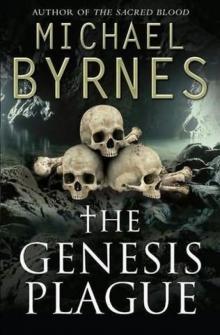 The Genesis Plague (2010)
The Genesis Plague (2010)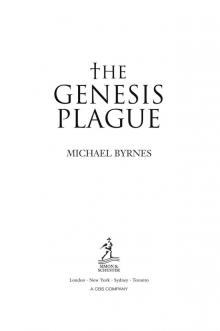 The Genesis Plague
The Genesis Plague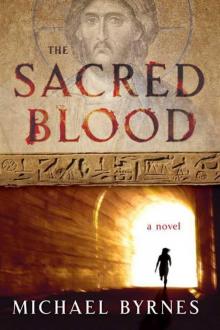 The Sacred Blood
The Sacred Blood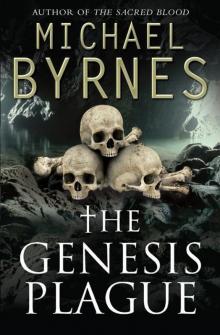 The Genesis Plague tf-1
The Genesis Plague tf-1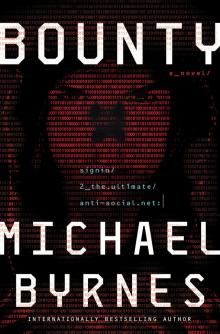 Bounty
Bounty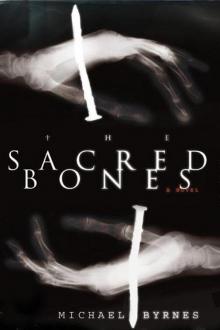 Sacred Bones : A Novel
Sacred Bones : A Novel